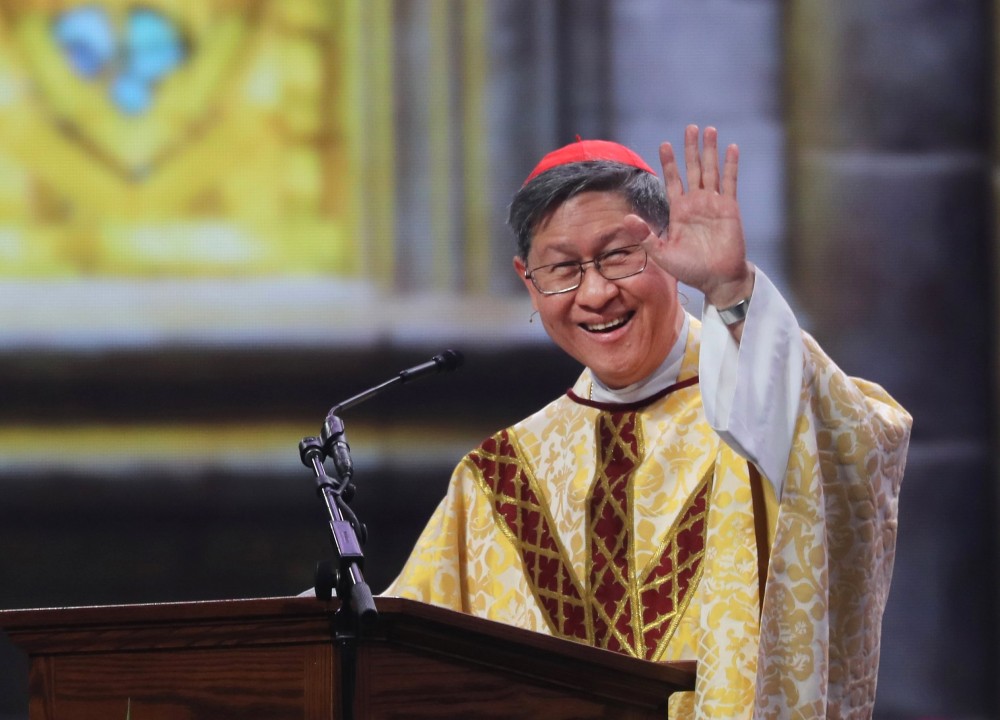
By Gina Christian
INDIANAPOLIS (OSV News) — Asian and Pacific Islander Catholics are uniquely primed to be Eucharistic evangelizers, with the faith of many fortified through their heritage of enduring persecution, Cardinal Luis Antonio Tagle told OSV News.
The Filipino cardinal — who served as Archbishop of Manila from 2011-2020, and who is now pro-prefect of the Vatican’s Dicastery for Evangelization’s Section for First Evangelization and New Particular Churches — shared his thoughts with OSV News July 19 amid the 10th National Eucharistic Congress in Indianapolis, to which he was the papal envoy.
Just prior to the congress, Cardinal Tagle was the special guest at the Asian and Pacific Island Catholics National Encounter, held July 15-17 at Indiana University and Purdue University, both in Indianapolis. Sponsored by the U.S. Conference of Catholic Bishops’ Subcommittee on Asian and Pacific Island Affairs, the encounter — which drew more than 300 participants — focused on the theme of “Radiant Faith: The Witness of Asian and Pacific Islander Catholics.”
Key to that witness is an innate connection to the Eucharist that is reinforced through essential elements of Asian and Pacific Islander cultures, said Cardinal Tagle.
“I think Asian and Pacific peoples can resonate with the core of Eucharistic devotion,” he said, noting that the combined significance of meals, singing and storytelling in Asian and Pacific Islander cultures takes on an even deeper meaning in the liturgy.
“(The Eucharist) is a gathering of people; it’s a meal — but in this case, it’s a meal hosted by the Lord,” said the cardinal. “There must be singing, there must be storytelling, (and) the word of God is a story. And then there must be a sharing of food, a communion. … I look at the flow of the liturgy and say, ‘This is the flow or the dynamism of Christian life — gathering in humility, listening to stories. You bring the gifts and then you eat, and then you go home bearing the gifts.’ Now, that’s very Asian and Pacific.”
According to the federal government, Asian American, Native Hawaiian and Pacific Islander communities are among the fastest growing in the U.S., currently representing just over 6% of the population, or 7.5% if combined ethnicities are counted. California and Hawaii are home to substantial Asian and Pacific Islander communities.
Pew Research data published in 2023 showed that despite overall religious disaffiliation trends, Christianity remains the largest faith group among Asian Americans, with 34% identifying as such. Among that cohort, 17% are Catholic and 16% are Protestant, with 10% of Asian Americans in the U.S. describing themselves as born-again or evangelical Protestants.
“If we could only tap the resources of the culture and connect the cultures with the teachings of the Bible and the Eucharistic practice, I think we can empower (Asian Americans and Pacific Islanders) to evangelize,” said Cardinal Tagle. “They understand what the mystery of the Eucharist is.”
In addition, many Asian and Pacific Islander Catholics in America can attest to “the strength that they discovered in the midst of their suffering” due to persecution experienced in their nations of origin, said the cardinal.
Open Doors International, a global advocacy organization supporting persecuted Christians, states on its website that of the more than 365 million Christians experiencing high levels of persecution and discrimination worldwide, two in five reside in an Asian nation. North Korea is named by the organization as the most repressive country for Christians. (Asian and Pacific Islander groups in America have also experienced racial and ethnic discrimination, both historically and in recent years.)
“In Asia and in the Pacific, Christians are used to being a minority,” said Cardinal Tagle. “So in terms of our faith experience, even if you belong to the majority tribe, but you’re (also) a Christian, you belong to the minority. So I think that that has brought suffering to many because there are restrictions to religious practice, and (for) some even to the point of persecution. But I think it is a gift, you know, it has strengthened many of the Asian and Pacific Islanders.”
As an example, the cardinal noted that he had recently met a priest from Vietnam, who told him he had been one of the Vietnamese boat people, refugees who had fled South Vietnam after it fell to communist North Vietnam in 1975.
Seeing several refugees at a camp and processing center in the Philippines, the priest was reminded of Jesus Christ, said the cardinal.
“He said, ‘That person (who) has suffered a lot … can give a testimony to how the faith is real — how Jesus is real, and how he accompanies people,” said Cardinal Tagle.
